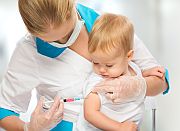
MONDAY, March 16, 2015 (HealthDay News) — Pockets of unvaccinated children appear to have fueled the recent measles outbreak traced to Disney theme parks in California, researchers report.
“The Disneyland outbreak is quite possibly a direct consequence of the growing anti-vaccination movement in the United States,” said study author Maimuna Majumder, a research fellow at Boston Children’s Hospital.
Although the person who started the outbreak has not been identified, the researchers analyzed outbreak data and found the rapid spread of the disease indicates that most of those infected were not vaccinated or were incompletely vaccinated.
As of March 6, 142 of the 173 measles cases in the United States had been tied to the Disney outbreak that began last December, according to the U.S. Centers for Disease Control and Prevention.
Although the national average for measles, mumps and rubella (MMR) vaccination in the United States is quite high — about 92 percent — pockets of under-vaccinated children are breeding grounds for outbreaks, Majumder explained.
The researchers found that “substandard” vaccination is likely to blame for the Disney measles outbreak. “Substandard vaccination means that less than 96 to 99 percent of the population exposed to measles during the course of the outbreak were vaccinated,” she said.
Because measles is so contagious, that high level of vaccination coverage is necessary to prevent outbreaks, Majumder noted. “In our study, we found that MMR vaccination rates among the exposed population [in the outbreak] may be as low as 50 percent and likely no higher than 86 percent,” she added.
“If the anti-vaccination movement in the U.S. continues to grow, the likelihood of outbreaks will increase — as will their scale and scope,” Majumder said.
The report was published as a research letter in the March 16 online edition of the journal JAMA Pediatrics.
Dr. Paul Offit, chief of the division of infectious diseases at Children’s Hospital of Philadelphia, said, “As herd immunity erodes, it’s the most contagious diseases that come back first.”
Herd immunity occurs when most of the population has been vaccinated for an infectious disease, thereby providing some protection for people who are not vaccinated.
Offit said the measles vaccine is “so effective that you can eliminate the disease as we did by 2000. But it’s a highly contagious disease, so if you get any sort of erosion in herd immunity, the disease comes back,” he said.
While measles is not particularly fatal for healthy children, it can cause severe complications among those with weakened immune systems, Majumder said.
“Unfortunately, these children are often ineligible for the vaccine and thus must rely on the immunity of their neighbors, friends and peers to stay safe. So, if you can get vaccinated, do get vaccinated — herd immunity depends on it,” she said.
Offit thinks that the Disney outbreak may be a tipping point in public opinion on the issue.
“I have never seen so much anger towards parents who are choosing not to vaccinate,” he said. “There was something about the Disney outbreak that really upset people.”
According to a recent HealthDay/Harris Poll, 87 percent of more than 2,000 adults surveyed said they thought that the vaccines routinely given to young children are safe. That’s up from 77 percent found in a similar poll last July.
Among the poll’s other findings:
- 82 percent of respondents say childhood vaccinations should be mandatory for all children, up from 77 percent in the July poll.
- 79 percent say there’s at least a moderate level of risk that an unvaccinated child could contract a disease that vaccinations are designed to protect against. That’s an increase of 5 percentage points since the July poll.
- 69 percent say a child contracting a vaccine-preventable disease such as measles would present at least a moderate danger to other children, up from 64 percent in July.
Dr. Vincenzo Maniaci, an attending emergency physician at Miami Children’s Hospital, said despite the renewed interest in vaccinations, under-vaccination remains a major public health problem.
“Vaccination rates in some areas of the country have gotten so low that it’s concerning,” he said. “There are going to be more major outbreaks. It’s just a matter of time.”
More information
Visit the U.S. Centers for Disease Control and Prevention for more on the measles.
Copyright © 2026 HealthDay. All rights reserved.

